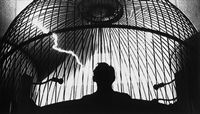
|
 |
Mr.
Death: The Rise and Fall of Fred A. Leuchter, Jr.
|
U.S.A.
/ 1999 / English / Color / 35mm (1: 1.85) / 91 min
Director: Errol Morris
Photography: Robert Richardson, Peter Donahue
Editing: Karen Schmeer
Music: Caleb Sampson
Producer: David Collins, Michael Williams, Dorothy Aufiero
Production Company, Source: Fourth Floor Productions
678 Massachusetts Avenue, Cambridge
MA 02139, U.S.A.
Phone: 1-617-876-4499 / Fax: 1-617-876-4540
E-mail: 4thfloor@world.std.com

|
|
Errol Morris
Studied philosophy at University of Wisconsin, Princeton, and University
California, Berkeley. He made his first film, Gates of Heaven
in 1978. Vernon, Florida (1981), his second film, was shown
at YIDFF '95. His 1988 film, The Thin Blue Line, won numerous
awards including The New York Film Critic's Award. A Brief History
of Time (1992) won the Grand Prize and the Filmmakers Award at
Sundance. His 1997 documentary, Fast, Cheap & Out of Control
won the American Film Critic's Award. Morris served as a juror at
YIDFF' 93. 
|
Meet Fred Leuchter, an expert in electric chairs, lethal injection
machines, gallows and gas chambers. To opponents of capital punishment
who ask him if he sleeps well at night, this mild-mannered middle-aged
gentleman replies, "I sleep very well at night, knowing that
those persons that are being executed with my equipment have a better
chance of having a painless, more humane and dignified execution."
Simulating the look of a B-movie Sci-Fi horror, director Errol Morris
explores the universe of this eccentric pragmatic philosopher - whose
thoughts are so based on pragmatic realities that they may sound surreal.
Leuchter's accounts are re-enacted and visualized by master cinematographer
Robert Richardson, of Martin Scorsese's Casino (1995) and
Bringing Out the Dead (1999), whose bravura reaches a new peak
in this film, its magnificence so literally brilliant that you may
not believe these scenes are re-enactment of real incidents.
Morris also utilizes virtually all the technical possibilities of
digital non-linear editing to shuffle 35mm film footage, CGIs, video,
8mm home-movies and historical footage, to portray this quite unique
individual and his even-more-amazing turns of life which also involve
arguments on one of the biggest crimes in human history. Even though
the film takes interest in Leuchter, it does not necessarily affirm
his opinion about... being a proponent of capital punishment, for
instance. Either you agree or disagree with him, you cannot ignore
that his presence itself rases shrewd question about the fundamentals
of humanity.
[Fujiwara Toshifumi]
Director's Statement
We are now separated from the events of World War II
by over fifty years. What does it mean to deny the past or to reimagine
it in such a way that it loses all meaning?
In all of my movies I have been obsessed with how people reveal themselves
through their use of language. Fred Leuchter is one of the most prolific
talkers I have ever encountered. And yet, a puzzle remains. Who is
this man? Humanitarian? Humanist? Scientist? Truth-seeker? Hero? Charlatan?
Is he playing some grotesque game with reality and truth or does he
really believe what he is saying?
I like to think of this film as a mystery story where the ultimate
mystery is not what really happened but rather the mystery of personality,
the mystery of who we are.
|
  |
|
before  next next |
COPYRIGHT:Yamagata International Documentary Film Festival Organizing Committee |